Account based zk-Rollup with unlinkable transactions
Tsvetan Dimitrov
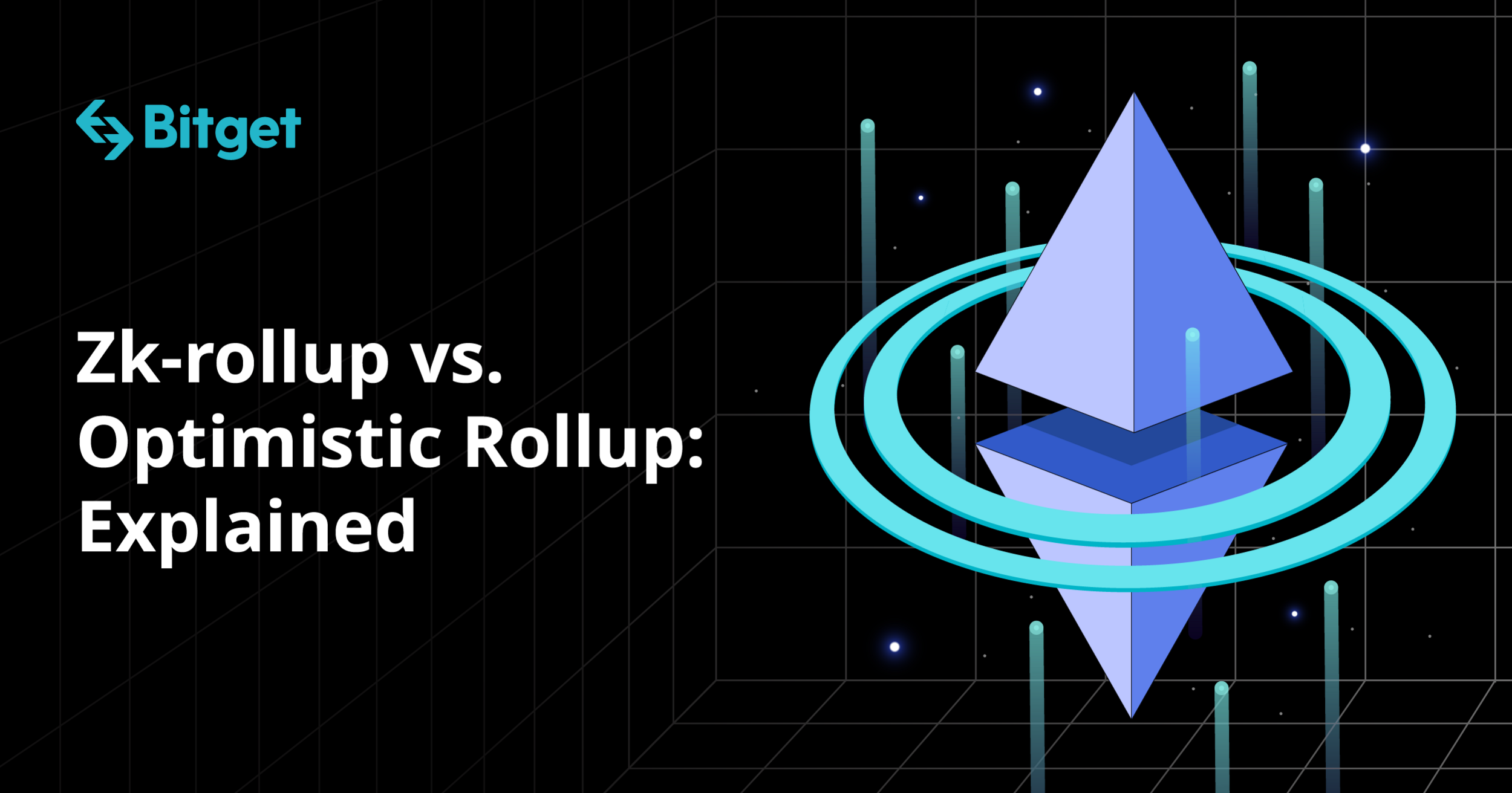
Agenda
-
Requirements
-
Protocol Overview
-
Data Structures
-
Protocol Operations
-
On-Chain Flow
-
Off-Chain Components
-
Performance Optimizations

Requirements / 1
-
Perform anonymous transactions on Ethereum.
-
Payments based around accounts and money orders.
-
Three types of actors:
-
Users
-
Operators
-
Observers
-
Requirements / 2
-
Users keep their account data private.
-
Operators are only aware of account hashes.
-
Observers collect information about rollup state and transactions (users, operators or outsiders).
-
Senders create a money order, and register to an Operator.
-
Receivers redeem a money order and send an update to an Operator.
-
Sender and Receiver are hidden from any Observer.
Protocol Overview
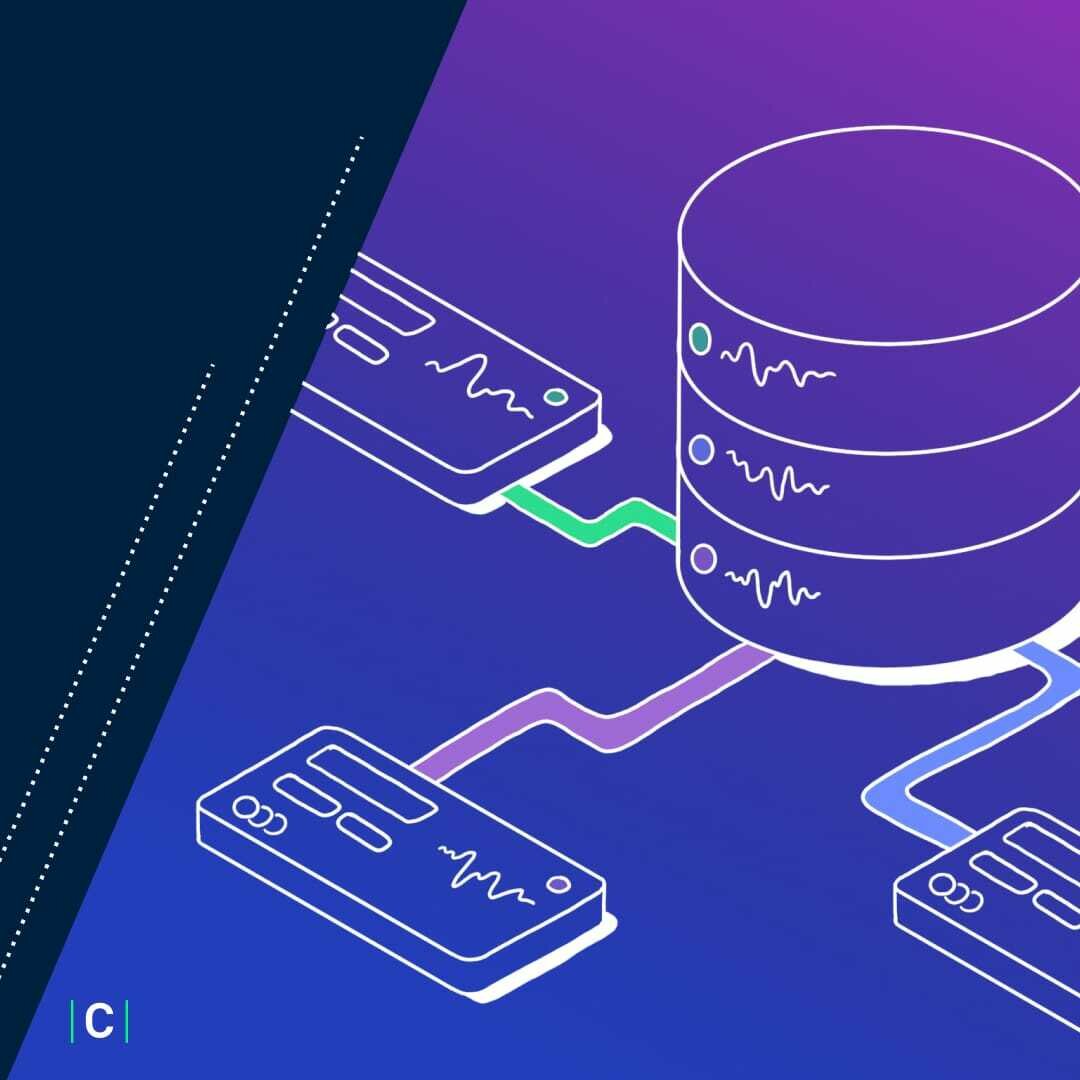
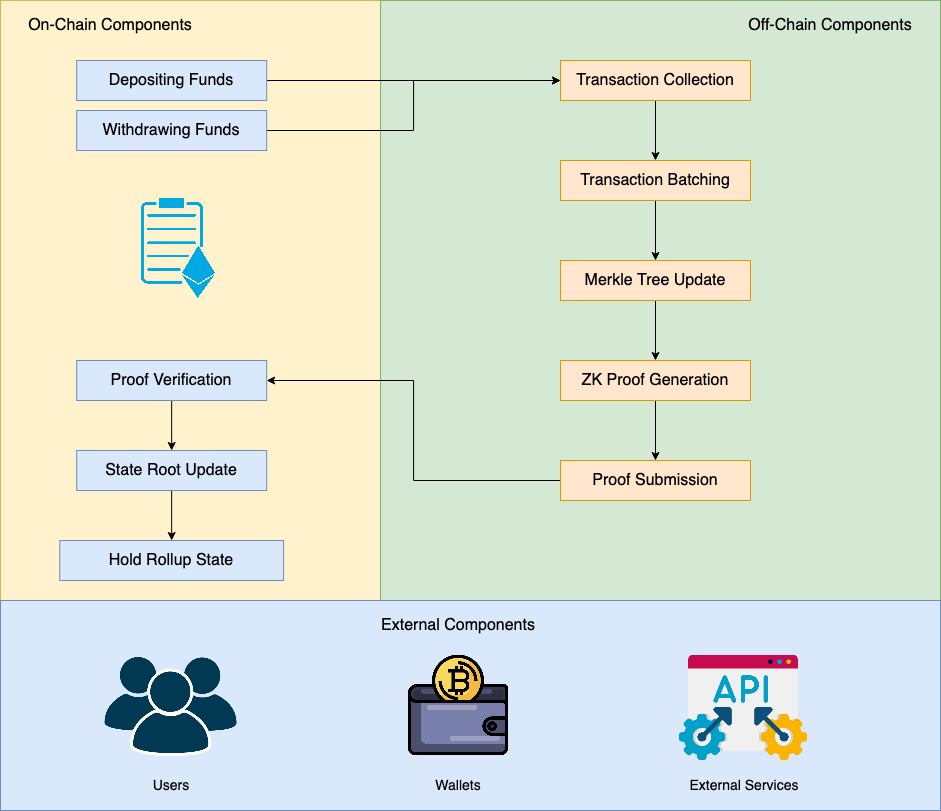
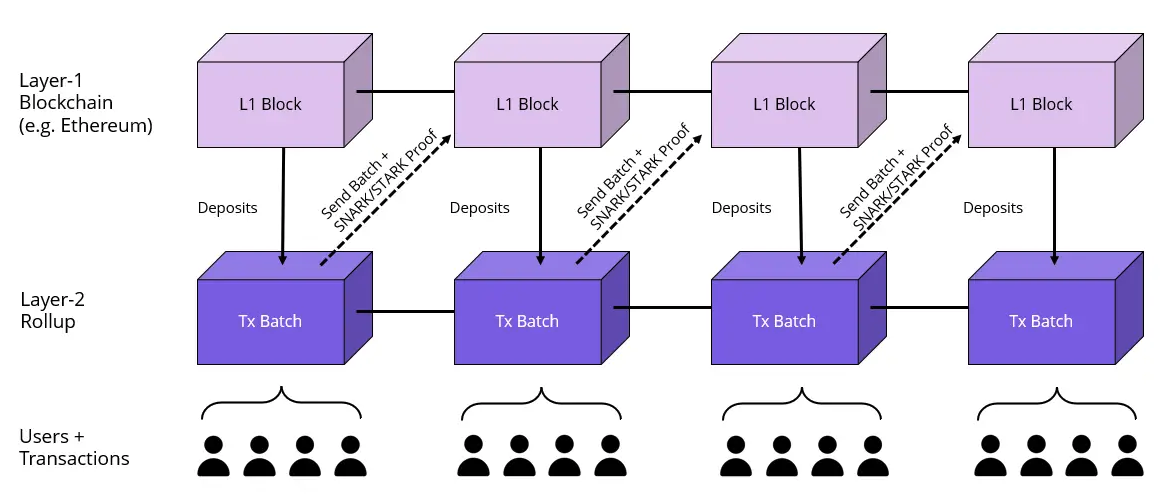
Data Structures

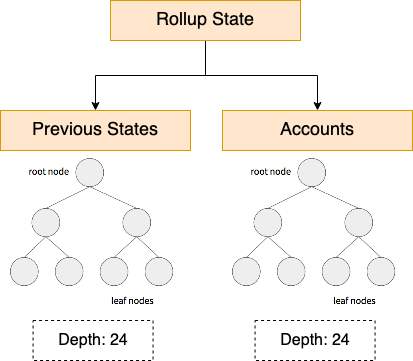
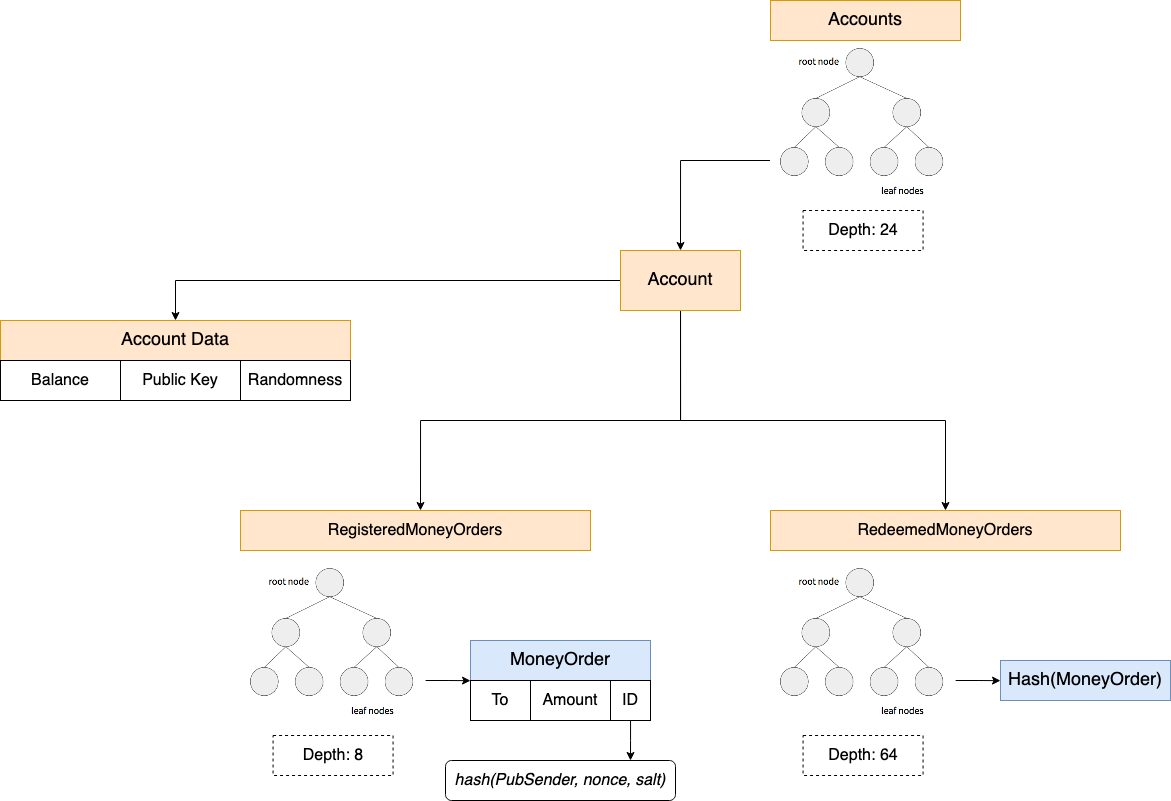
State Transition Function (STF)
Transaction: tx
Old State Root: R
New State Root: R'
STF (R, tx, accounts, merkle_proofs) -> R'
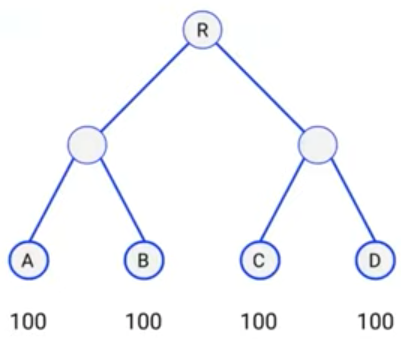
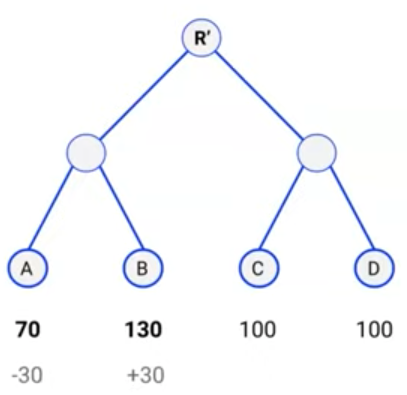
Zero Knowledge Proof of STF
STF (R, tx, accounts, merkle_proofs) -> R'
witness
Arithmetization
Proving
SNARK Proof
Arithmetic Circuit
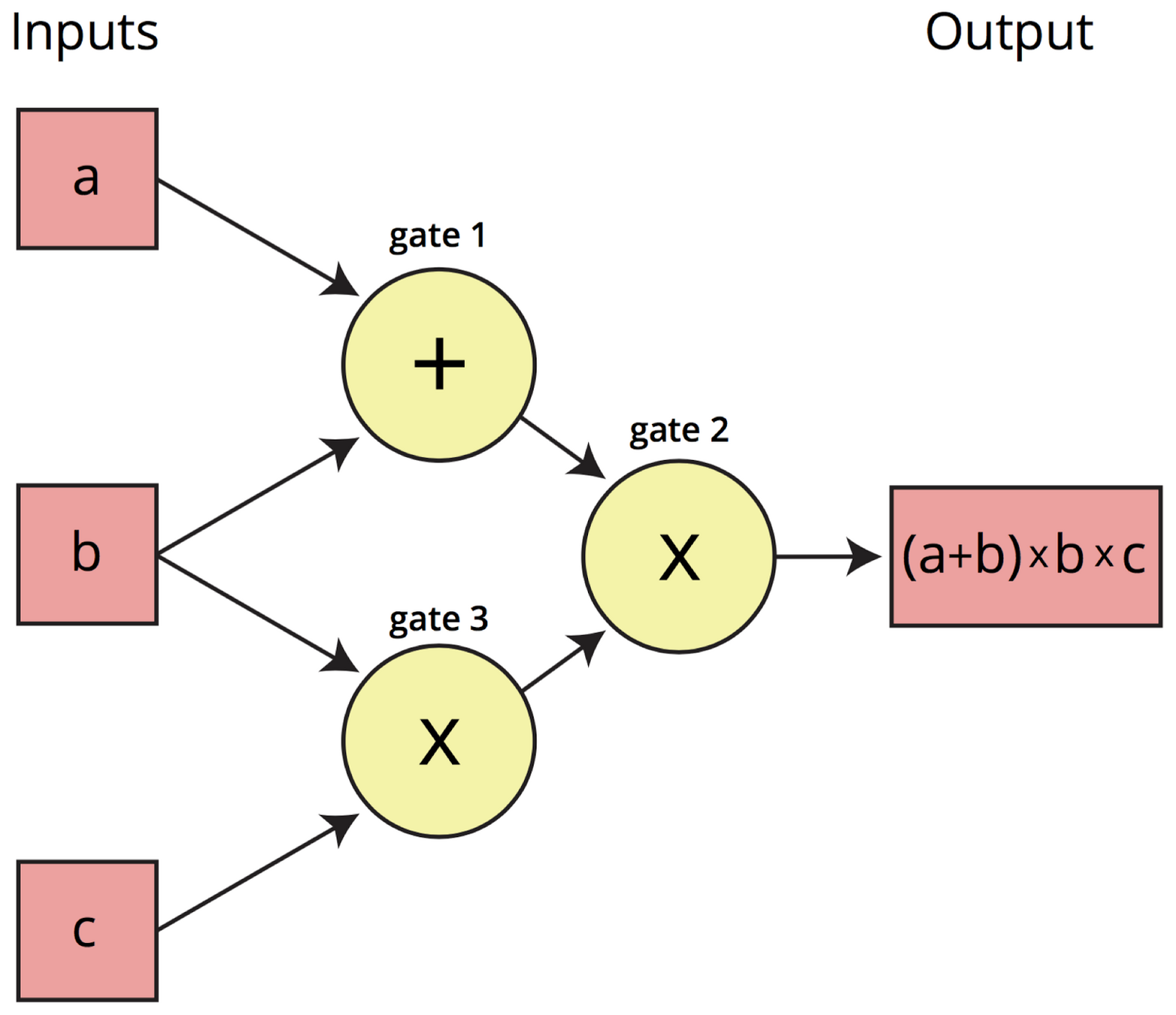
-
DAG where the inputs are your initial nodes.
-
Nodes go through a network of gates (add, mul).
-
Eventually an output gets accumulated.
Arithmetization and Proving

- R1CS Conversion: A * B = C (dot product).
- QAP Conversion (set of quadratic equations that should yield a target polynomial).
- The result is a problem that involves checking polynomials at a particular point.
- The prover convinces the verifier that they know an assignment of variables that makes all the polynomial equations hold.
Recursive Aggregation / 1
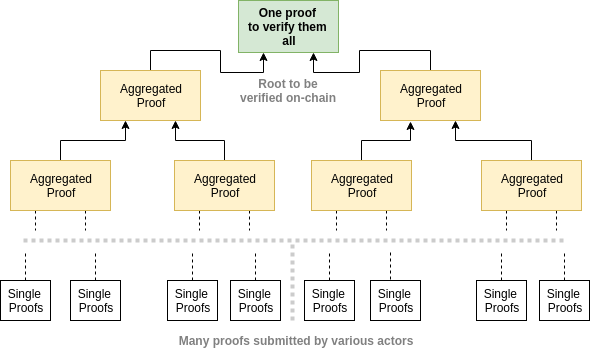
Recursive Aggregation / 2
-
Create a ZKP for each transaction, resulting in N separate proofs.
-
Then create another ZKP that attests to the validity of N previous proofs. This is an aggregate proof.
-
Continue this process, creating a new ZKP each time that attests to the validity of the previous aggregate proof and the next transaction proof.
-
In the end, you are left with a single proof that can be verified to confirm the validity of all the original transactions.
Protocol Operations

Money Transfer (Sender-> Receiver)


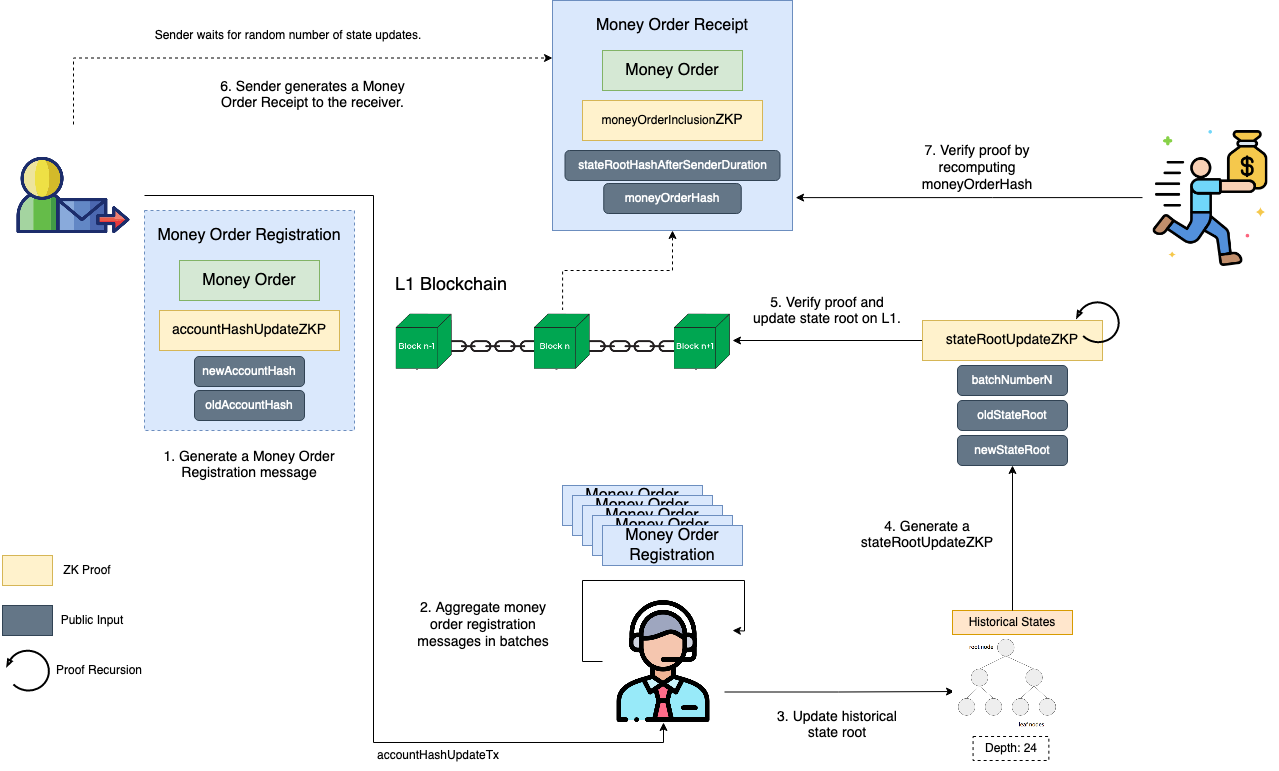
Receiver Money Order Redemption

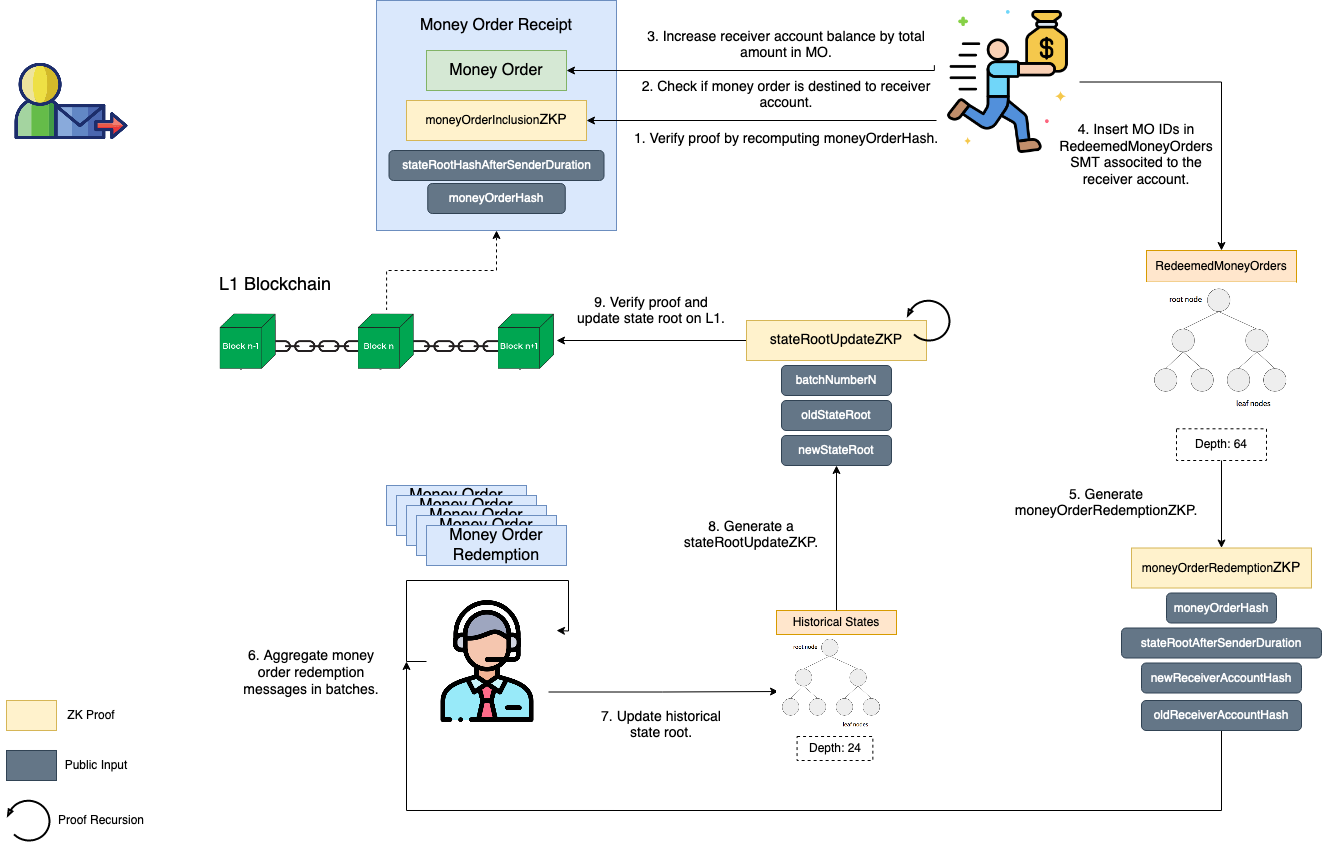
On-Chain Flow
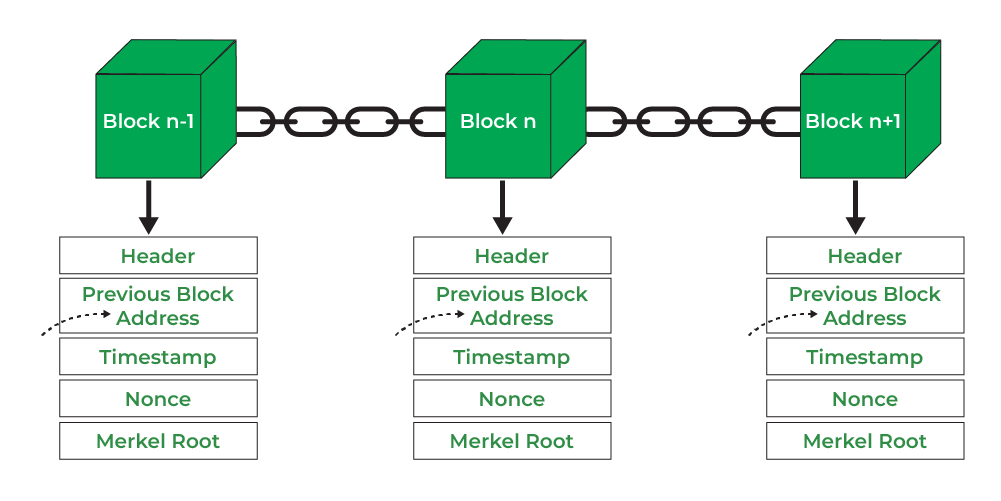
Operations
-
Rollup State Management
-
Depositing Funds
-
Withdrawing Funds
-
Proof Verification
-
State Root Update
Rollup State Management
pragma solidity ^0.8.0;
contract ZkRollup {
bytes32 public stateRoot;
constructor(bytes32 _initialStateRoot) {
stateRoot = _initialStateRoot;
}
}Depositing Funds
event Deposit(address indexed depositor, uint256 amount, uint256 index);
function deposit(uint256 amount) external {
require(msg.sender.transfer(amount), "Transfer failed");
uint256 depositIndex = ...; // Calculate deposit index
emit Deposit(msg.sender, amount, depositIndex);
}
Withdrawing Funds
event Withdrawal(address indexed recipient, uint256 amount);
function withdraw(
address recipient,
uint256 amount,
bytes calldata proof) external {
require(
verifyWithdrawalProof(recipient, amount, proof), "Invalid proof");
(bool success, ) = recipient.call{value: amount}("");
require(success, "Transfer failed");
emit Withdrawal(recipient, amount);
}
function verifyWithdrawalProof(
address recipient,
uint256 amount,
bytes calldata proof) internal view returns (bool) {
// Implement the actual proof verification
// logic based on the chosen zk-proof system
}Proof Verification and State Root Update
event StateRootUpdated(bytes32 newStateRoot);
function updateStateRoot(
bytes32 newStateRoot,
bytes calldata proof) external {
require(verifyProof(newStateRoot, proof), "Invalid proof");
stateRoot = newStateRoot;
emit StateRootUpdated(newStateRoot);
}
function verifyProof(
bytes32 newStateRoot,
bytes calldata proof) internal view returns (bool) {
// Implement the actual proof verification
// logic based on the chosen zk-proof system
}
Off-Chain Components
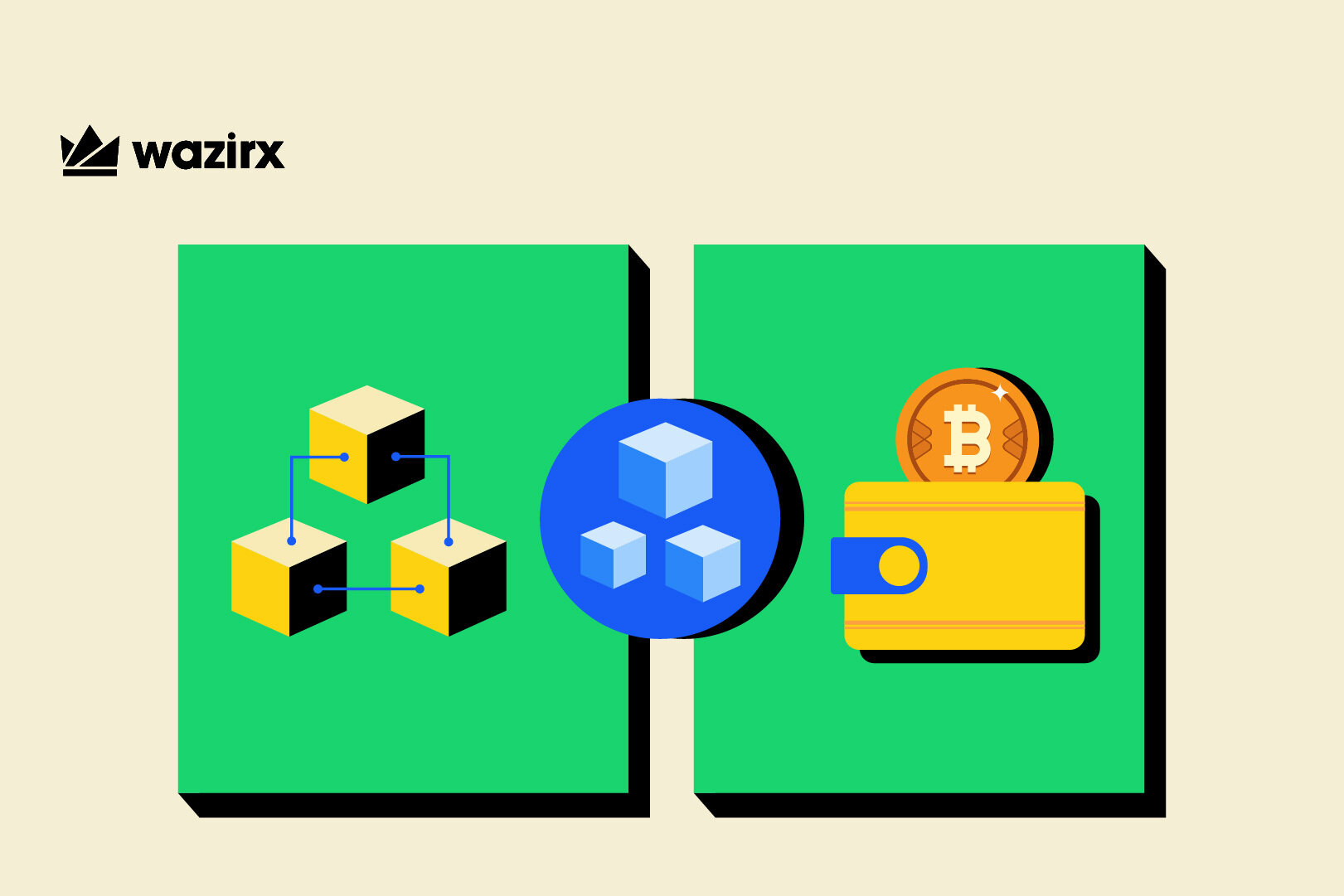
Transaction Aggregator
-
A server or a set of servers responsible for collecting individual transactions from users.
-
Queues transactions for inclusion in the next proof.





zk-SNARK Circuit Compiler
-
Translates your protocol rules into a zk-SNARK circuit.
-
One-time process, but very critical for the operation of the rollup.
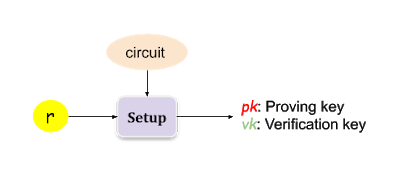
zk-SNARK Prover
-
Takes a batch of transactions and the current state as input.
-
Generates a zk-SNARK Proof attesting to the validity of these transactions.
-
A computationally intensive process.

Data Availability Layer
-
The transaction data (sender, receiver, amounts, etc.) can be stored off-chain in a separate layer.
-
This can be a distributed file system, a peer-to-peer network or any other reliable system.
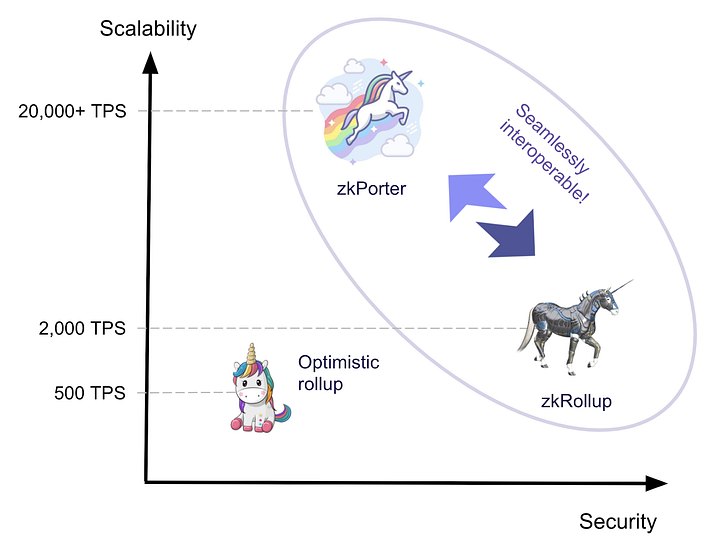
Client Software
-
Users interact with the zk-Rollup through web/mobile apps or command line tools.
-
This software creates transactions, sends them to the transaction aggregator, verify proofs and checks the state of the system.

Monitoring and Alerting Systems
-
Ensure smooth operation of off-chain components.
-
Alert developers or operators to any issues or anomalies in real-time.
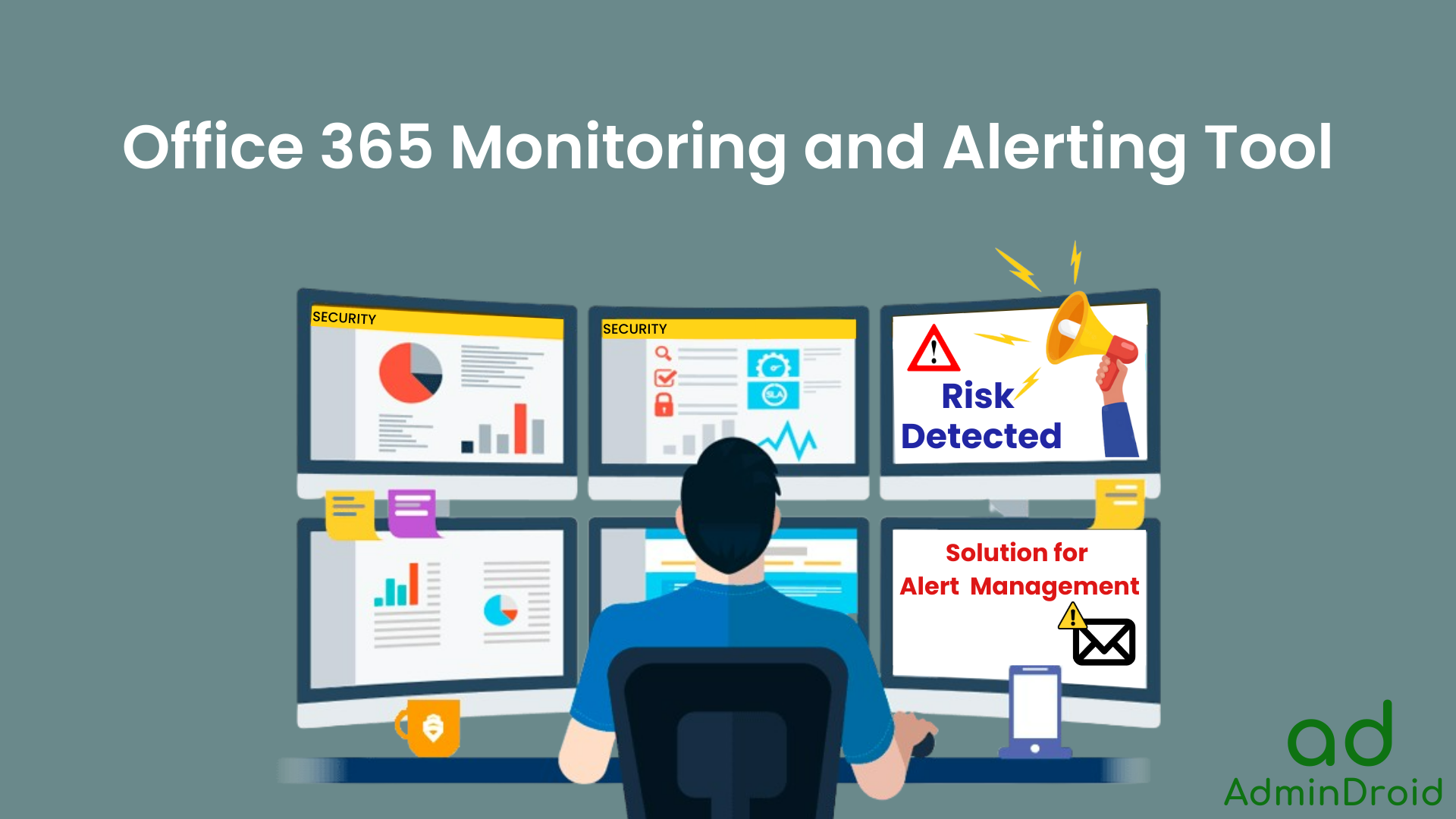
Load Balancers and Networking Infrastructure
-
Handle the communication between clients, the transaction aggregator, the prover and the blockchain.
-
Ensure network traffic is efficiently routed and no single point of failure exists.
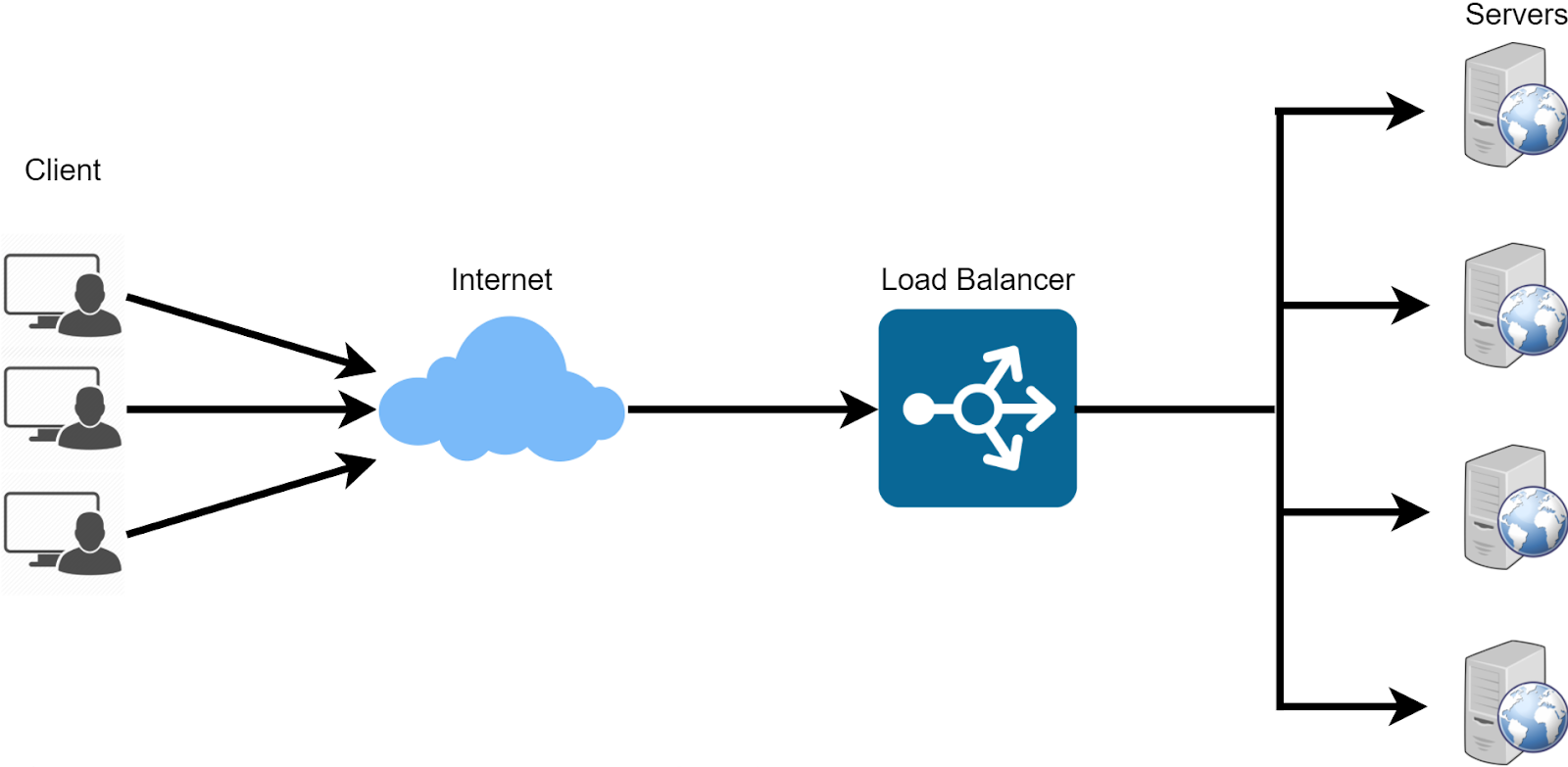
Notes on Decentralization
-
Components can be run by different entities to enhance security and trustlessness.
-
They could run their own transaction aggregators or provers.
-
Users can opt to verify proofs themselves if they don't trust the operators.
Performance Optimizations
-
Tune transaction batch size.
-
Parallel Proof Generation.
-
Optimize Circuit Design.
-
Fast Data Availability.
-
Efficient Signature Verification inside a zk-SNARK.
-
Choose Efficient zk-SNARK Constructions.
-
Caching and DB Optimization for Account Data.
Summary
-
Defined an Account based anonymous zk-Rollup protocol.
-
Defined Account and Rollup State data structures.
-
Defined protocol operations, on-chain and off-chain flow and components.
-
Suggested some performance optimizations.


Questions?
Account based zk-Rollup with unlinkable transactions
By Tsvetan Dimitrov
Account based zk-Rollup with unlinkable transactions
Introduction to software versioning and release management best practices
- 188



